Here what’s in store for you this week:
- Strengthening de-facto integration of the self-proclaimed Luhansk and Donetsk statelets into Russia gains momentum with upcoming parliamentary elections;
- Influential Russian Orthodox torpedoes Sputnik V’s eroded image from within by dispersing antivax sentiments;
- We report from within latest environmental disaster in the Russian Arctic;
- Plus, we investigate the long and bizarre case of former agriculture minister Elena Skrynnik, embroiled in a money-laundering investigation.
Want to get the full story? Click the links below for full-length articles in Russian.
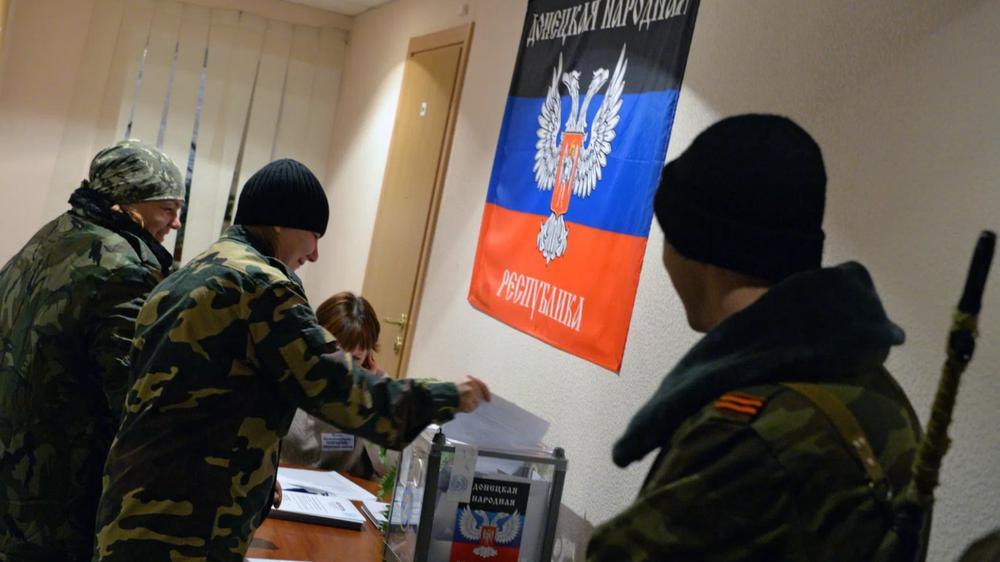
Photo: RIA Novosti
De-Facto Integration of Donbas Statelets, Explained
Upcoming parliamentary elections in Russia, scheduled for September, will mark another momentum in expanding de-facto integration of the self-proclaimed Luhansk and Donetsk statelets in Eastern Ukraine. Numerous separatist politicians from Donbas will run for seats in the Russian State Duma — as Russian citizens. It became possible thanks to two things. First, the Kremlin spent seven years handing out Russian passports to approximately three million people still populating these statelets. Second, the Russian ruling party has been actively recruiting locals to integrate into federal politics. This week our correspondent Daria Kozlova examines why United Russia needs patriotic «volunteers» from Donbas statelets.
LEGITIMIZATION OF INTEGRATION. The Kremlin might deny its military presence in parts of Ukraine outside of Kyiv control and refuse the term' occupation.' Yet, political integration of the Donbas statelets has been underway for years. Take a local pro-Russian militia leader Alexander Borodai. He has announced his candidacy for a Russian parliament seat, despite remaining a self-proclaimed 'prime minister' of the so-called 'Donetsk People's Republic.' Borodai has said in the past that the Russia-controlled regions would not become part of Russia. But if he wins this Fall, it will be a prolific example of expanding formal legitimization of Russian political control over the territories. In addition, many other local military and political figures announced their intention to run for Russian parliamentary seats or join Russian election campaigns in different roles.
IN A BIZARRE TURN, A DISGRACED HOLLYWOOD STAR HELPS TO WHITEWASH DONBAS INTEGRATION. Another two prominent figures in Donbas statelets, Zakhar Prilepin and Alexander Kazakov seek election to the State Duma. On Sunday, Prilepin posed for pictures with former Hollywood celebrity Steven Seagal (hiding in Eurasian authoritarian states from sexual assault lawsuits back at home.) Prilepin was part of an army of pro-Russian separatists in eastern Ukraine and admitted to commanding a combat unit that has killed some 14,000 people in seven years.
WHY WOULD THE KREMLIN RECRUIT DONBAS WARLORDS AS MPS FOR A RUSSIAN PARLIAMENT? The idea is to create an illusion that residents of these Russian-backed statelets have a say about their future and a choice, says Russian political scientist Mikhail Savva. «Give one Prilepin,» he says, «the others — Borodai.» One of Borodai's local supporters explained to our correspondent their reasoning: «He is a Russian patriot; he knows the problems of Donbas, the problems that Russians in Ukraine have to deal with. Therefore, no one doubts that if he is elected to the State Duma, he will represent them.»
PLUS, THE STATELETS ARE A MUCH-NEEDED ELECTORAL EXTRA RESOURCE FOR MOSCOW. According to various estimates, it might add up between 0.5% and 1% to the total number of Russian voters. For the Kremlin struggling with decreasing public support, every opportunity to inflate the illusion of widespread support counts.
TO CAST A VOTE WILL BE PROBLEMATIC. NO GUARANTEES IT WILL BE COUNTED, EITHER. From an organizational point of view, voting in Russian elections is quite problematic for the residents of Luhansk and Donetsk statelets. Up until this point, only voted on Russian territory, and the nearest option is the border Rostov region. In last year's constitutional referendum, Russian authorities would provide organized bussing for locals willing to vote. Now, it seems that the Russian Federation is planning to open some polling stations in the region and ensure electronic voting is possible. Although in one way, 'DPR' and 'LPR' voters are absolutely equal with the Russian voters — their ballots will face voter fraud. Russia hasn't had a free or fair election since at least 2004.
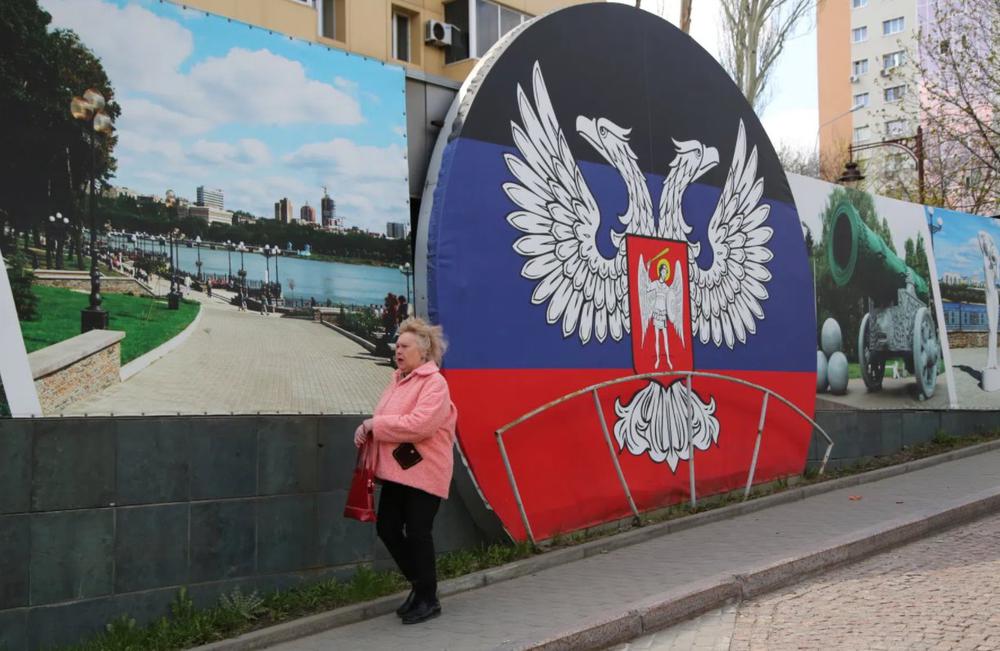
Photo: RIA Novosti
BACKSTORY. The so-called «Donetsk People's Republic» and «Luhansk People's Republic» remain home to 3,000,000 residents despite heavy fighting sporadically breaking out in the area. The breakaway territories became self-proclaimed statelets after the 2014 pro-democratic revolution in Ukraine. The separatist movement was part of the Kremlin attempt to preserve political and economic control over the country. As then-president Ukrainian president Yanukovych fled to Russia, Moscow annexed the Ukrainian region of Crimea while stoking unrest in the country's eastern regions — effectively establishing control over 7 percent of the Ukrainian territory. At the time, Russian state propaganda manufactured a false narrative of an ethnic divide in Ukraine. It has been using it as an excuse to keep meddling in Ukrainian affairs since then. Moscow has never officially acknowledged the invasion of Eastern Ukraine. Still, the presence of Russian troops on the ground is well-documented, including by Novaya. The seven-year war has left approximately 13,500 dead, 1.6 million internally displaced, and over 800,000 refugees.
Read the full piece on scheduled Russian parliamentary elections in Donbas statelets here.
Sputnik V Resistance at Russian Orthodox Church, Explained
The Kremlin spent over a year on an intense global campaign promoting the Russian-made COVID-19 vaccine. But back at home, there's a widespread Sputnik-V skepticism. It is pervasive even at the Russian Orthodox Church, the most loyal to the Kremlin institution.
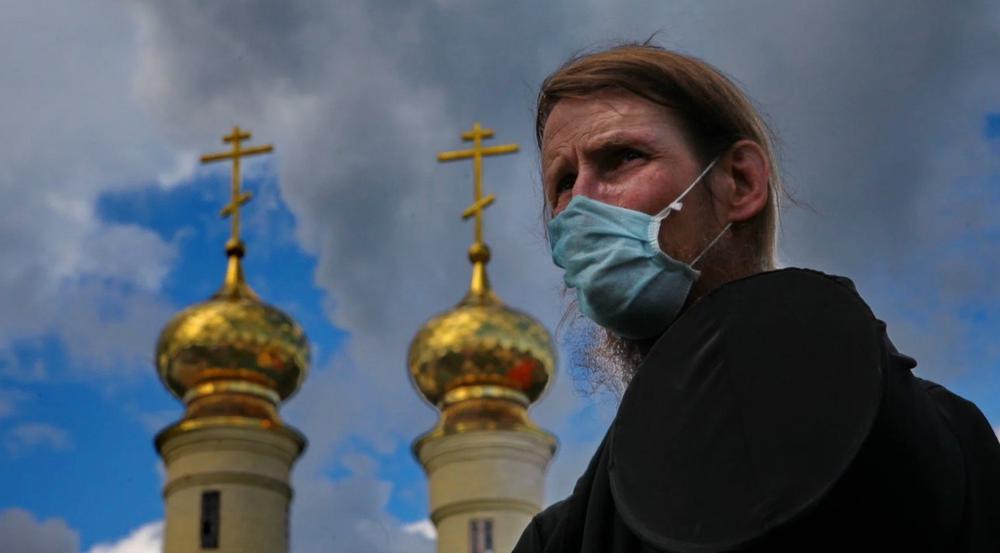
Photo: : PhotoXPress
THE RESISTANCE WORSENS THE ONGOING THIRD WAVE OF THE PANDEMIC IN THE COUNTRY. The church, which holds an outsized role in public life and maintains close, co-dependent ties to Putin and the Kremlin elites, has been skeptical of the coronavirus in general. Despite the country being the epicenter of one of the worst outbreaks in the world in 2020, Russian religious leaders would openly flaunt lockdown regulations and spread conspiracy theories questioning the pandemic's nature.
SPUTNIK V RESISTANCE IS FUELLED BY CONSPIRACY THEORIES CIRCULATED AND CREATED BY THE CHURCH. Take «Pandemic of Lies,» for example. A viral 'documentary' backed by the church and produced by ultra-conservative Russian director Galina Tsareva hit more than a million views on YouTube. Vaccines are «revealed» to be a global government conspiracy to reduce the world's population. But, initially, there was also a popular and Church-backed belief that 'the faithful' would not be 'punished' with the illness.
«A 'mystical' version began to gain popularity: those Christians who live piously will not be affected by the pandemic, and sanitary restrictions in churches are blasphemy, the sin of lack of faith,» notes in this week's column our religion columnist Alexander Soldatov. However, the deaths of key church figures, including respected priests during the pandemic, gradually dissolved this idea, he adds.
ANOTHER CONSPIRACY POPULARIZED BY THE CHURCH LINKS SPUTNIK V TO ABORTED FETUSES. Specifically, it claims that the Sputnik V vaccine is produced using cells of aborted human fetuses. Human embryonic kidney (HEK) cells, to be exact. This is a popular antivax myth targeting all vaccines, in general. The belief suggests that by getting vaccinated, one is somehow also implicitly becoming embroiled in the initial 'sin of abortion.' Although no known COVID-19 vaccine carries HEK cells, the overall secrecy surrounding Sputnik V's production doesn't help in demystifying the claim.
MIXED MESSAGES FROM THE CHURCH LEADERSHIP. Although the head of the Russian Orthodox Church, Patriarch Kirill, was publicly hesitant to receive the vaccine, he did it anyway. Soldatov speculates that this hesitation made it clear that he was not actively blessing the vaccination.
THIS IS ALL PART OF A BROADER PUBLIC SKEPTICISM OVER SPUTNIK V. Russia's last remaining independent pollster Levada Center recently found that the vast majority of Russians are not willing to be vaccinated against COVID-19. Some 62 percent of respondents were actively unwilling, and 56 percent are not even afraid of contracting coronavirus. Since December, vaccination points have been open in Russia, but few people appear to be queuing up to use them. Our political editor Kirill Martynov has drawn a link between the severe erosion of public trust towards Russian state institutions and disastrous vaccination efforts.
BACKSTORY. In total, some 114,000 people have died from Covid-19 in Russia, according to official figures. However, the actual number is likely to be much higher. Russia had one of the largest Covid-19 outbreaks globally. But official statistics aren't always the most reliable indicators of the situation. Our investigations exposed the government 'doctoring' both mortality and vaccination rates linked to Covid-19. Our Covid-19 data tracker found relatively reliable data in only about ten out of 85 regions, most of which had low infection rates.
Read Soldatov’s full column on Orthdox antivax obsession here.
Komi Oil Spill Gets Worse
Oil has been flowing through the Komi region for three weeks now following an environmental disaster in the region. A year ago, the largest Arctic oil spill in recent history, the so-called Nornickel Spill, coated more than 20km of rivers and waterways in greasy residue. So how are they linked, and why do they keep happening? This week Novaya's Alexey Tarasov lifts the lid for our special podcast series 'What's New.' Plus, our Arctic correspondent Tatyana Britskaya reports from the epicenter of the Komi oil spill.
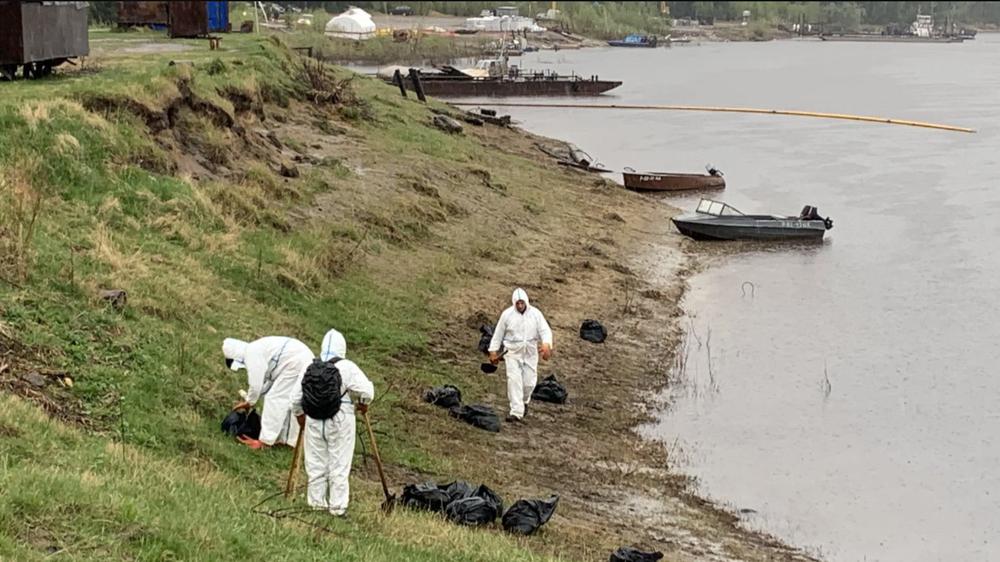
Photo: Novaya Gazeta
THE CULTURE OF PREDATORY PILLAGE OF RUSSIAN NATURAL RESOURCES. Last year the northern Taimyr peninsula saw Russia's worst fuel spill ever. The official reason provided was that the spill was the corrosion of a vital fuel storage tank, releasing some 17,500 tonnes of fuel into the environment. But the deeper reasons clearly remain, both financial and systemic. «This is the standard economic practice of exploiting resources,» Tarasov notes.
COLLECTING SUPER-PROFITS BUT SENDING NOTHING BACK FOR INFRASTRUCTURE UPGRADES. The company behind last year's spill, Norilsk Nickel (or Nornickel), paid a record fine of around $2 billion. In addition, it has offered small concessionary payments for devastating the ecosystem of affected indigenous communities on the condition that they drop any lawsuits. However, the deeper, underlying problems remain unfixed. The Russian extraction of natural resources is dominated by the obsession with super-profits, and the government rarely demands reinvestment into environmental safeguards or recovery mechanisms. Moreover, the Kremlin has been systematically dismantling environmental laws and regulations in the recent decade.
«To spend money not on major repairs, not on updating the technical base materials but simply distributing it via dividends,» Tarasov explains.
KOMI SPILL GETS WORSE. In the Komi Republic (an autonomous Russian region in the Arctic part of the country) on May 11, around 100 tons of oil-containing liquid, belonging to Lukoil, spilled into the nearest rivers. It is moving towards the Arctic ocean now. Meanwhile, not only environmental devastation but economic ruin also accompanies the Russian mining of natural resources. «At the main Komi airport, visitors are greeted by a poster: 'LUKOIL-Komi is 30 years old'. Having arrived in the regions, the company assumed obligations to eliminate old spills and the entire dilapidated Soviet oil infrastructure. However, pipeline renovation is slow, and leaks are detected in the hundreds,» our correspondent Tatyana Britskaya reports from Komi.
POVERTY AND RUIN NEXT TO RUSSIAN OIL RIGS. Britskaya wrote an open letter to Lukoil head Vagit Alekperov inviting him to see the consequences of the latest spill with his own eyes.
«The village teacher Yekaterina Dyachkova will feed you a lunch — if there is wood to light the stove. You can also enjoy her bathhouse — if it is not flooded by rains. Otherwise, you, like all the inhabitants of the village, you can experience what it is like to live with no running or clean water», Britskaya writes, documenting the everyday problems local residents face. «You will see with your own eyes not only how your oil flows along the Pechora River, but also how people are struggling to survive just 4 km from your drilling rig,» her letter says.
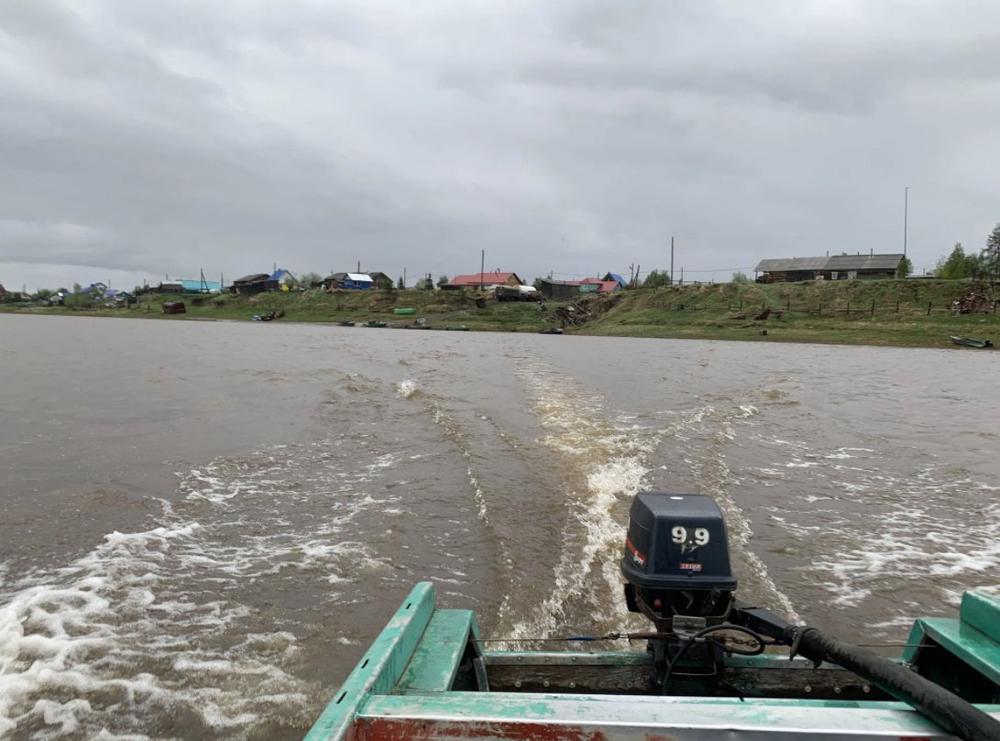
Photo: Novaya Gazeta
BACKSTORY. The Russian government keeps expanding the industrial harvesting of natural resources deep into previously protected nature reserves. For that, the Kremlin dismantles Russian environmental regulations to maximize the country's profits. This couples with aggressive military expansion in the Russian Arctic as the government rushes to take over new trading routes opening up due to climate change. These policies provoke more and more man-made ecological disasters and further abuse vulnerable indigenous communities. Last year the Arctic saw the largest human-made fuel spill in its history. Back then, the Russian government colluded with the country's largest nickel producer to whitewash the disaster. The spill has also damaged the environment that provided local indigenous communities with basic food supplies.
Listen to the latest episode of Novaya’s “What’s New” podcast here and read Britskaya dispatch from the epicenter of the Komi oil spill here.
Bonus Corner
- FORMER MINISTER OF AGRICULTURE AND MONEY LAUNDERING SCANDAL.
We dive into the bizarre case of Elena Skrynnik, the former Russian minister of agriculture between March 2009 and May 2012. In 2015, Swiss authorities reportedly froze up to 60 million francs (US$ 61 million) held in bank accounts belonging to Skrynnik as part of a money laundering investigation. She was later expelled from United Russia for “actions discrediting the party.” She strongly denied the reports or even that she had such funds, according to state media. But the former official later moved to France with her family, and purchased a villa worth 10.8 million euros. The reason for the initiation of a criminal case in Switzerland was the reports of banks, which suspected potential money laundering in the transactions of their clients. Novaya revisited new evidence in the case and successfully confirmed many of the suspicions by Swiss prosecutors.
- FULL KREMLIN EMBRACE OF LUKASHENKA FOLLOWING THE PRATASEVICH KIDNAPPING SURPRISED INDEPENDENT RUSSIAN OBSERVERS.
Putin's growing frustration with the inability of Lukashenka to end the domestic turmoil has not been a secret. 'The losses of the Belarusian economy [from the scandal — ed.] will be substantial, and it looks like the Russian taxpayers will pay for them. Lukashenka has nowhere to turn for help except Moscow. The Kremlin decides to pass on an opportunity to play a good cop, chooses to back the Belarusian dictator full-heartedly,' writes Novaya's political columnist Kiril Martynov. He thinks that the Kremlin's own intensifying crackdown on dissent prevents the Russian ruling elites from criticizing Lukashenka's latest poorly thought-through move. It is particularly galling that the Russian state continues to financially support such state-sponsored terror when poverty is an ever-increasing problem at home. “Everything that awaits Russia is happening in Belarus right now,” Martynov grimly warns. “Whereas in 2019 there were many thousands of rallies in support of journalist Ivan Golunov, almost any political life is now banned …The state is killing civil society.”
To keep up with Novaya Gazeta’s reporting throughout the week, you can follow us on Facebook++, Twitter++, Instagram++, and Telegram++. Our video content is available on Youtube++, and don’t forget to visit our website https://www.novayagazeta.ru++ for the latest stories in Russian. — The Novaya Gazeta Team